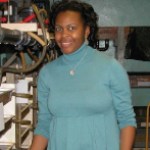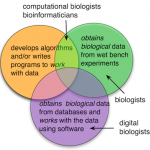Science Careers
A simple web search says biotech is really big. One estimate indicates that the industry will have $400 billion in sales in 2017 with growth to over $775 billion by 2024 [1]. Another report suggests there are over 77,000 employers [2]. That’s big, but is it real, and what you can do with this information?
Worldwide locations of biotechnology employers. Source Biotech-Careers.org
At Biotech-Careers.org we're interested in helping students and graduates of biotech programs at community and four-year colleges learn about the multitude of opportunities available in the…
If you want to work in biotech, you have to get work experience. But, how do you find it?
One way to find work experience is to do an internship.
When do I look?
If you're a college student, and you're planning to wait until spring to apply for a summer internship, you're waiting too long. The time to look is NOW. Many of the best internship opportunities appear between the beginning of December and end of February.
Where do I look?
As far as where, quite a few places have regular internship programs. I listed some examples below.
[View the story "'tis the season - to apply for summer…
If all the information you had about scientific careers came from newspapers or TV, it would be easy to think that everyone who works in life sciences / biotechnology is either a Ph.D. scientist, post-doc, or graduate student. In reality, the life sciences are more like an iceberg. The public sees the people at the top, with advanced degrees, while the many people who have bachelors or associates degrees are hidden from view.
The NIH has realized that a fair number of people they hire are community college graduates who have associate degrees in…
As you may have noticed from the extended radio silence, it's been a busy few months between classes (both taking them and giving them), tenure packaging, and research. To add another responsibility to the mix, I gave a talk a few weeks back at the National Institute for Animal Agriculture's annual symposium. This year, the featured topic was antibiotics and agriculture, so I was invited to give an overview of methicillin-resistant Staphylococcus aureus and livestock.
While I'm always happy to give talks to new audiences, discussing my work and the state of the field in general, I have to…
If there is one piece of advice that marine biologist and Nifty Fifty Speaker April Croxton would give young students aspiring to pursue a career in science it would be: Don't narrow down your career choice in science too early. "Science is so vast an area, encompassing so many disciplines, some of them often intersecting and crossing over to other areas that also may be appealing to you," says April, a fishery biologist at the National Marine Fisheries Service of the National Oceanic and Atmospheric Administration (NOAA) in Milford, CT. "Take time to explore and study as many areas of…
Disclaimers - just so you know...
This information is cross-posted at www.bio-link.org
All the data and graphs in this post were obtained from Simplyhired.com.
I do not have any kind of commercial affiliation with this company I found their site via GenomeWeb.
Having worked around biotechnology for several years, I thought I was pretty familiar with biotech job descriptions.
I decided to test this assumption by playing with the data at SimplyHired.com.
Being able to quickly search with different terms and examine trends in job postings has proved to be an enlightening experience.…
When I was a post-doc, I spent a few months seriously thinking about changing careers and teaching high school. I might have followed through on that plan, too, but I didn't know how to pay for it.
Today, if you have a background in science, technology, math, or engineering, you can retrain to become a teacher and the National Science Foundation will help. The Robert Noyce scholarship program has funds to help ease that transition to the classroom.
From the NSF web site:
The Robert Noyce Teacher Scholarship Program seeks to encourage talented science, technology, engineering, and…
"What's in a name? that which we call a rose
By any other name would smell as sweet"
- Juliet, from Romeo and Juliet by William Shakespeare
I realized from the comments on my previous post and from Mike's post that more explanations were in order.
It seems we have two topics - why do we need a new name at all? and why the current names (biologist, computational biologist, bioinformatician, etc.) don't work. What really distinguishes a digital biologist from a regular, garden variety biologist? Why isn't a digital biologist a computational biologist?
So, I brought along two "show and tell…
What do you call a biologist who uses bioinformatics tools to do research, but doesn't program?
You don't know?
Neither does anyone else.
The names we use
People who practice biology are known by many names, so many, that the number of names almost reflects the diversity of biology itself.
Sometimes we describe biologists by the subject they study. Thus, we have biologists from anatomists to zoologists, and everything in between: addiction researchers, chronobiologists, epidemiologists, immunologists, microbiologists, neuroscientists, pharmacologists, physiologists, plant biologists,…
I've just returned from two conferences that focused on educating students for careers in science and technology and what do I find here at the home fort? There's Chad writing a very nice series on science careers!
I was a little puzzled by PNAS acryonym in his titles since to me, PNAS stands for "Proceedings of the National Academy of Scientists" and is a high impact scientific journal. But then I realized that Chad is a physicist and he might not know this. It's quite possible that PNAS isn't as big in the physics community as it is in biology.
Anyway, this is a very nice series, so way to…
A friend of mine; serial entrepreneur, and former president of Genetic Systems; Joe Ashley, told me once that starting a business is an unnatural act.
Now that I've done it, I agree. Even with my multiple back-up plans, possible grants, and part-time activities, my stomach still hurts and my mind is racing. My new company has "spun out" of another. Spinning out of control until you fall down from exhaustion. It's a great metaphor all right.
Sure, there's excitement and adventure. I love my new shiny business cards and my new shiny web site! It's fun to do things that I like and would…
My husband brought this fantastic book home from the ASHG* that I think many of you will find interesting.
The book is: Making the Right Moves A Practical Guide to Scientific Management for Postdocs and New Faculty, published in 2006 by the Burroughs Wellcome Fund and the Howard Hughes Medical Institute.
You can download the book for free at the HHMI site and there's even a video of Tom Cech.
In fact, this book has such great information, that if it weren't for the interesting discussions in the comment section, I truly think this book would put Drug Monkey Comrade PhysioProf, and Isis…
The lab I work in at the University of Illinois has recently acquired funding for several graduate student positions. If you are considering a career in taxonomy, genomics, phylogenetics, biodiversity, tropical ecology, or parasitoid wasps, click here for information about the positions.
Ponder the following: you'd get your graduate degree from one of the finest entomology institutions in the world. Plus, it's paid for. And, if you choose the Heterospilus project, you'll get the rare honor of working with, um, me.
The first lab mouse I touched had soft white fur and a light pink tail. It looked cute enough to snuggle and take home as a pet and I was smitten. I slipped my hand into the cage, thinking the mouse would respond like my pet gerbils or my brother's pet rat. As my hand closed around its belly, that sweet little mouse sunk its teeth deep in my thumb. I screamed and shook my hand, smashing the mouse on the cement floor and killing it in an instant.
It's been many years now since I've been doing anything with mice or rats. There's much more oversight these days, as DrugMonkey has been…
start all over again.
MDRNA Inc., a Puget Sound area company formerly known as Nastech, announced on Monday that they'd be laying off 23 people including their president and chief business officer. This might not sound like a lot, but according to Joseph Tartakoff, from the Seattle PI, this brings the total number of layoffs up to 145 since November.
These events present a challenge to those of us who teach in biotech programs or biotech-related fields. Nastech, the predecessor to MDRNA had been around for over 20 years. Who would expect a 20+ year company to shed three quarters of it's…
The Southeastern United States has long been recognized for producing talented scientists and technicians. But are too many of them leaving the Southeast to find jobs? I recently explored this issue in an article that was published in the August 2008 edition of Tech Journal South. Georgia, North Carolina and Florida were selected as representative Southeastern states. The problems they face-and solutions they create-are likely to reflect on other neighboring states. Area scientists and administrators, including those who work in the Southeast or are actively involved in recruiting and…
Pfizer has pledged to donate up to $10,000 to the cause of science education, through Donorschoose.org, but only if enough of you, dear readers go to Big Think: Think Science Now and vote for your favorite video.
If you're not familiar with Pfizer, they're a pretty well-known drug company. You probably read about one of their products every time you delete messages from your e-mail in-box.
You don't even have to watch the videos, just vote.
I strongly recommend watching the videos, though. They are all profiles of scientists who work at Pfizer or other research organizations. It's…
A little over ten years ago, Dr. Elaine Johnson obtained funding from the National Science Foundation to start Bio-Link, an Advanced Technology Education center, focused on biotechnology. Since that time, Dr. Johnson has become a national leader in biotech education, enlisting the country's top educators and industry captains to ensure that community college students receive a quality education and the best preparation possible for entering the workforce.
In this radio interview from Tech Nation, Dr. Johnson talks with Dr. Moira Gunn about the easiest way to a biotech career.
A Career in…
For aspiring technicians, who live in the right parts of the country, biotech jobs are out there and waiting. But what if you don't want to be a technician? Or what if you're in graduate school, in a post-doc, or have a Ph.D. and simply want to do something else?
Where do you begin?
How do you know what sorts of positions are going to be a good match for your skills and talents? Is the outlook really as bleak as it may seem?
First, the prelude. Most of what I'm going to write will apply to many more people than the small population with Ph.D.s. This little bit of advice is an…
"Why won't biotech companies hire people with Ph.D.s to be technicians?"
"I already have a Ph.D., how do I find a job?"
These were some of the questions that commenters left after my earlier posts (here, here and here) on biotechnology workforce shortages.
Unfortunately, for these students and post-docs, the shortfall of employees in the biotech industry is largely a shortfall of technicians. It is a sad thing that promoting science careers can have the unintended consequence of creating a surplus of unhappy post-docs and even more unhappy graduate students. Perversely, many of the…



